Bu içerik, İngiltere’deki eski işçi erkekler kulüplerinin yaşadığı zorlukları ve değişen zamanlara uyum sağlama çabalarını ele alıyor. Ülkedeki bazı kulüpler, genç üyeleri çekmek ve ayakta kalmak için kendilerini yeniden icat etmeye çalışıyor. Louth Sosyal Kulübü, ismindeki “işçi erkek” ifadesini kaldırarak yeni üyeler çekmeyi hedefliyor. Benzer şekilde, Club and Institute Union da isminden “işçi erkek” ifadesini çıkartarak kendini yeniden tanımlıyor. Bu kulüpler, genç nesli çekmek ve ayakta kalmak için geleneksel cazibe unsurlarını korumaya çalışıyor. İngiliz kültür tarihçisi Dr. Ruth Cherrington, işçi erkekler kulüplerinin İngiliz toplumunda hala önemli bir yere sahip olduğunu belirtiyor. Bu kulüpler, ailecek eğlenilebilecek, uygun fiyatlı bir mekan sunarak bir ihtiyacı karşılıyor ve desteklenmeye değer görülüyor.
[ad 1]
Kaynak: www.bbc.com

 BBC
BBCThree quarters of working men’s clubs have closed over the past 50 years, according to their national association. Now, one of the oldest in the country has dropped “working men” from its name in an attempt to reinvent itself and attract new members.
“It’s very fun here, very non-judgmental, very chill,” says 20-year-old Anni Cawley, of the 150-year-old Louth Social Club in Lincolnshire. “Everyone’s very nice and welcoming.”
“It’s only women bar staff,” she adds. “Which is quite funny, considering it was a men’s club.”
On the wall outside, a stone sign advertises the original name: the Conservative Working Men’s Club. Managers decided on the rebrand earlier this year in a drive to attract new members.
Club secretary Steph Vines points out that it has not been conservative, nor solely for men, “for a long time”.
“I think there is a stigma of men’s clubs – it’s full of grumpy old men, or women are only allowed upstairs, and it’s just not the case any more,” she says. “Women have been welcome for the past 10 years and we also have junior membership.”

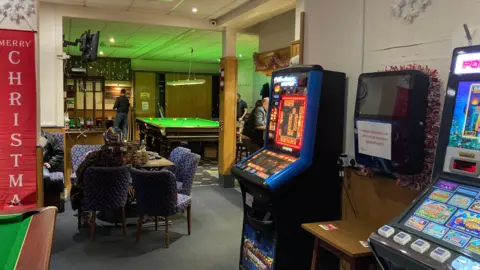
The rebrand was driven by more than just the changing times, however. In its glory days, the club had 1,000 members and a long waiting list, but over the decades, that figure dwindled to 300.
Earlier this year, the venue reached a “critical point” and managers did not know if they would be able to pay the wages. Steph says she feared it could close for good.
It is a familiar story. Many working men’s clubs have struggled with falling membership, a lack of funds, an outdated image and little interest from the under 30s.
In August, the nearby Cleethorpes Working Men’s Club announced it was closing due to falling numbers. Another casualty, the Monks Road Working Men’s Club in Lincoln, closed suddenly in 2018 after 100 years.

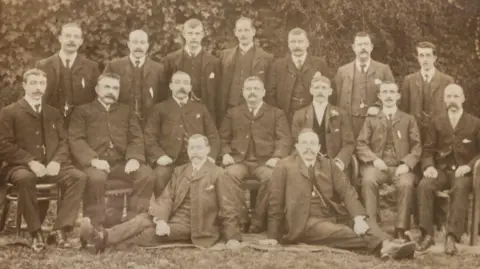 Supplied
SuppliedIn the 1970s, about 4,500 venues were members of the nationwide Club and Institute Union, but that figure has fallen to 1,100.
The union has undergone its own rebrand and, like Louth Social, has dropped “working men” from its title.
“People seem to think we are still in the 1930s and 40s,” says general secretary Ken Green. “I feel very sad about it.”
He blames the cost of living, a decline in the number of younger people going out drinking and an image problem. But he believes more clubs are now adapting to survive.
The union is offering business training to managers to help them run their clubs more efficiently.
“I think the future is not as rosy as what we’d like it to be, but the well run, well managed and well supported clubs will still be there long after I’ve gone,” Ken adds.

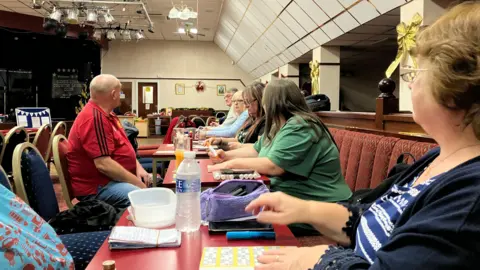
Down the road in Lincoln, the city’s last remaining working men’s club, Castle Ward, is buoyant, with 1,000 members.
Two of the figures behind the success are sisters Janet Ballam and Julie Lawson. They can trace their family’s involvement back to 1937, when their grandmother was on the founding committee. Back then, the club was housed in two wooden huts.
“It’s a passion,” says 63-year-old Janet, who runs a successful Monday club. “It’s in the blood.”
Unlike Louth Social, Castle Ward has kept “working men’s club” in its name. Vice-president Julie, 58, is keen to point out traditional selling points, such as “friendship, activities and entertainment at reasonable prices for all”.

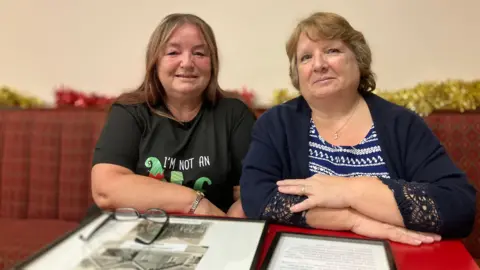
The Monday club, which offers trips, bingo and socialising, tends to attract the over-50s, but managers are aware of the need to bring in younger members.
“We’re a lovely, friendly bunch,” says Janet. “We do need to keep the younger generations coming to keep the club thriving.”
Dan Neale, a 36-year-old hospitality worker, comes to play snooker, but enjoys the “cheap drinks” and “nice atmosphere”.
“You see everywhere is getting dead expensive and there doesn’t seem to be a lot of support for clubs these days, so it’s really nice to see somewhere like this still open,” he says.
With bills continuing to rise, these qualities may work to the advantage of the clubs.
Dr Ruth Cherrington, a cultural historian who has researched the history of working men’s clubs, believes they remain important to British society.
“They should be supported because they do provide something that’s often lacking in many places in this country, and that’s somewhere relatively cheap to go out, socialise and have a bit of a night out and fun for the family,” she says.


Back in Louth, a successful open day has brought in new members, but the club is placing much of the focus on traditional attractions, such as darts and snooker.
Tables are hard to find in the area and the venue is offering lessons to 16 to 18-year-olds.
Sam Burnett, a 24-year-old shop worker, comes in a couple of times a week to practise snooker.
“To be honest, it’s a great atmosphere,” he says. “Obviously, you’ve got a lot of the old boys here, but they’re friendly as ‘owt.
“I’ll come in, they’ll say hello to me, they don’t even know me.
“I remember the first time coming in and having random conversations with random people. It’s like one big family.”

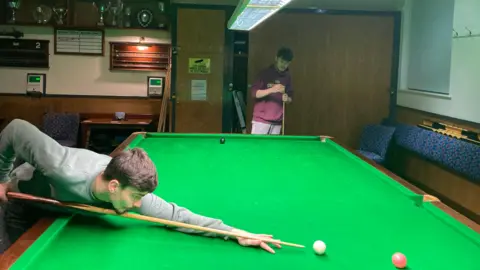
Money has been invested in facilities and a function room, but finances remain tight. A GoFundMe page has been set up to help with donations.
“I am hoping it picks up,” says Steph. “It doesn’t have to make money, it just has to financially sustain itself.
“I don’t take a wage, really. I work for next to nothing because I don’t do it for the money, I do it to keep the club going. I would be lost without it.”
Staff admit that it remains a struggle, but the drive to make the club more accessible is gradually bringing in new members. And the message to those who might never have considered trying it?
“People are missing out on some great craic, great pool nights, great snooker nights,” says bar worker Anni.
“If you ever want to pop in, you’re more than welcome. We’ll get you sorted right out. You’ll have fun.”
Listen to highlights from Lincolnshire on BBC Sounds, watch the latest episode of Look North or tell us about a story you think we should be covering here.







Yorumlar kapalı.